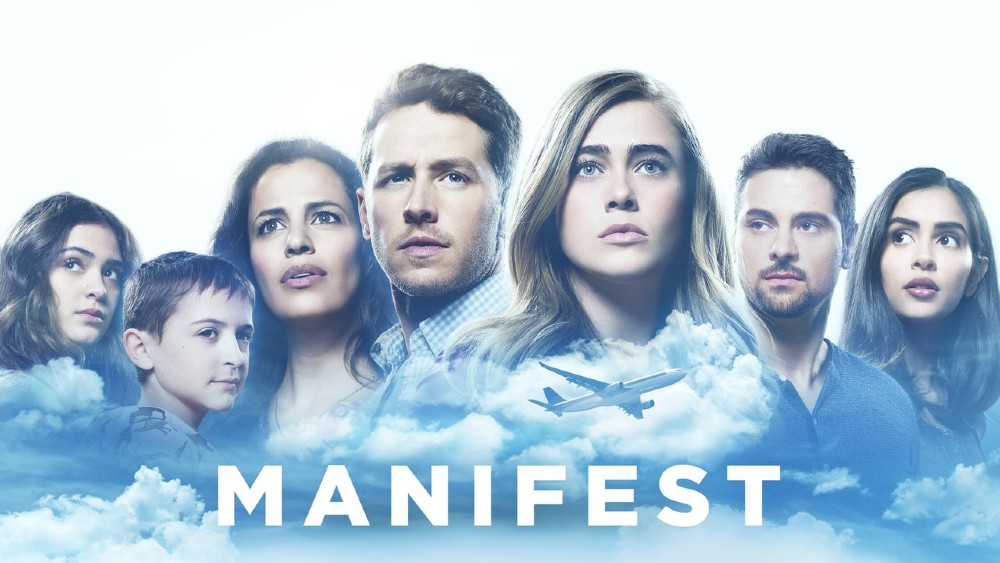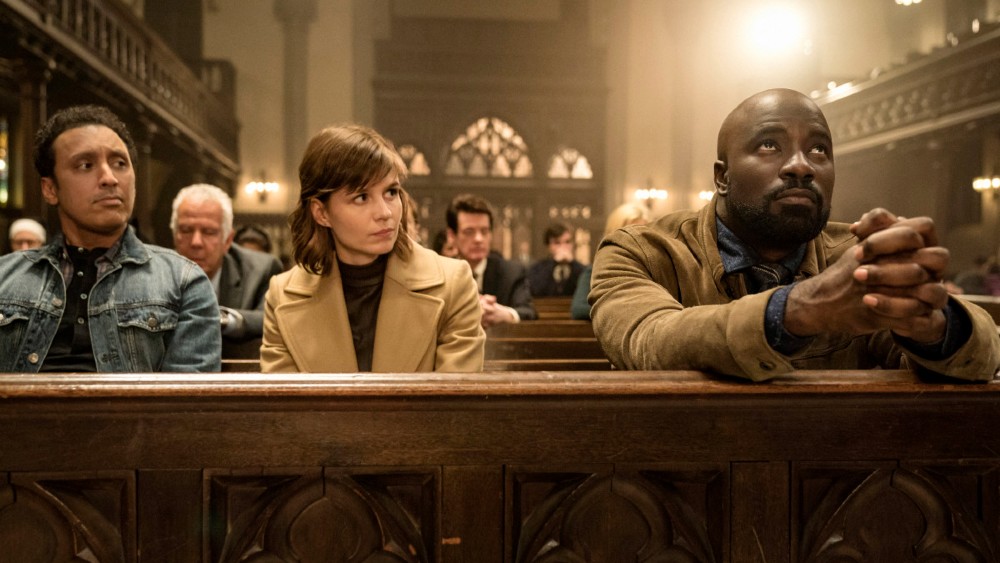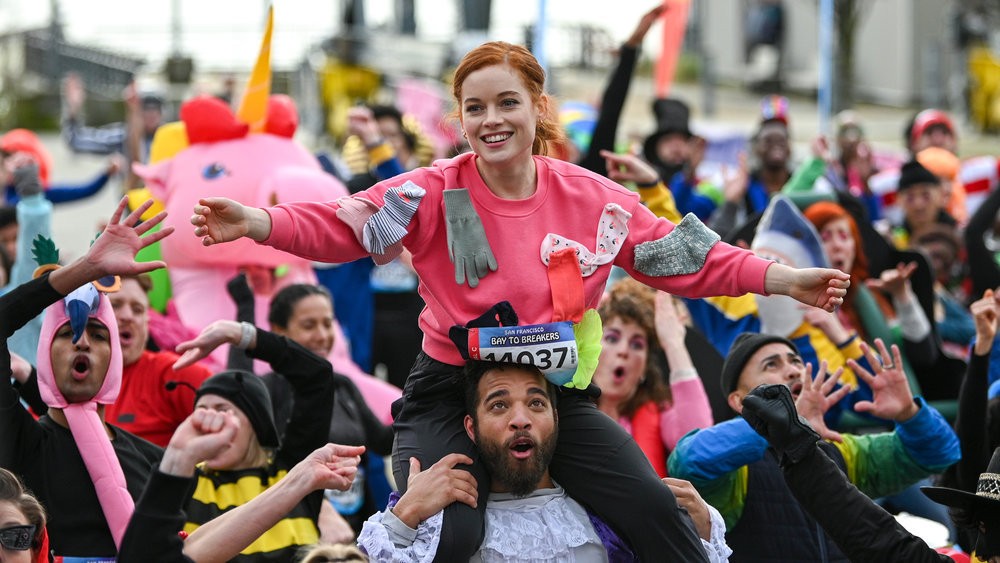
My fiancée and I don’t have a lot of TV shows in common. Part of it is that she doesn’t watch a lot of television, and when she does, she enjoys rewatching Parks and Recreation for the sixth or seventh time, which I certainly don’t mind, because it’s fun, and we get to laugh together. We did watch The Queen’s Gambit, too, but only after a couple months of badgering her about it — we were both big fans.
But interestingly, we discovered we both like watching Manifest on Hulu, after it had first appeared on NBC, naturally. I discovered the show in its first season, and actually wrote a feature about creator Jeff Rake and the cast for Emmy Magazine in the fall of 2018. Great group of people, and in that first season, terrific drama. Over the past two years, of course, the show got nuttier and nuttier, to the point where we spent a fair amount of this third season hate-watching it and asking each other how and when the whole thing had gone off the rails.
Even so, we were both surprised when NBC canceled the series halfway through its intended six-season run. Rake had, in fact, told me that was his plan when we spoke around Halloween three years ago. I asked him, “What happens if they don’t give you six seasons?” After we both said the obligatory, “God forbid,” and “Hopefully, that doesn’t happen,” and so on, he shrugged and said, “With any luck, they’ll give me a heads-up, so I can wrap things up properly.”
Well, NBC didn’t do that, and a few million fans — at least some of whom, I would guess, were like us and still watched for reasons other than why we started watching in the first place — erupted in displeasure about having been left in the lurch with an incomplete story and a deeply unsatisfying ending.
But then, just a few days later, it became apparent that the show was the most viewed on Netflix. People just loved it, and so a short-lived campaign was begun to save the show, though Netflix put the kibosh on it almost immediately, hence the “short-lived” description earlier in this sentence.
Still, rumblings about some kind of second life for the show continue, but the thing about all of this is, I’m sort of baffled as to why someone hasn’t just gone ahead and picked it up for a fourth season already. Seriously, with millions of people streaming it on Netflix, this doesn’t seem like such a ridiculous option. It’s not like it hasn’t happened before, either. Netflix took over production of Longmire and Designated Survivor, just to name two off the top of my head, when their networks originally canceled them, because enough of the streaming service’s subscribers watched the show’s earlier seasons to make it worthwhile.

Now, I suspect that the large cast and the generous expense of a show like Manifest might have a negative effect on that decision, but even in the newly dollar-conscious Netflix world, that doesn’t seem like a ton of money.
That’s sort of beside the point here, though, because I’m talking about something bigger, that just happens to be relevant to the Manifest situation. Thing is, there are lots of shows that were killed by one network only to be picked up by another (Brooklyn Nine-Nine is the most recent example), much less by a streaming service. Sometimes, a network will even shift a show from broadcast to streaming, like how CBS shifted the drama Evil to Paramount+.
That, actually, is the part of all this that makes the most sense to me. I’ve written in this space before about how fractured our viewing has become, and how we will almost certainly never again see a show that gets 30 or 40 million viewers every week, as Seinfeld did 20-some years ago. The reason for that is the increasing number of places where we can see these shows, and with those various and numerous services coming online, they each need lots and lots of content.
What people don’t often realize, probably because they don’t think it all the way through, is that each of these services has to have something like an infinite number of hours to fill. I don’t exaggerate. People need to be able to sign on to your service at any time of day and watch any show you provide. There are no time slots, no lines in which to wait, nothing like that. It’s push a button and watch the thing you want to watch, and it’s got to be on demand. And, the options have to be nearly endless, so that people come to your service and stay as long as possible.
I did a simple search for “how many hours of content are on Netflix,” and as of 16 months ago, it was 2.2 million minutes, which comes to roughly 36,000 hours, which is about four years. It’s even more now, obviously, it’s continuing to grow, and that’s just one service.
This is why it’s the best time ever to be creating television. The need is literally endless. Not so long ago, Netflix shocked people when it announced that it would be putting out a new TV show and a new movie every single week. Then, it seemed crazy. Now, it’s not just perfectly rational, it’s necessary.

And it’s for that reason why I don’t quite understand why any show that gets on the air somewhere is ever canceled anymore. If a show has proven that it can work, that’s already two-thirds of the battle. Not enough people watch it on one network or service? Maybe someone else will have better luck. Case in point, Zoey’s Extraordinary Playlist, which NBC canceled after two year, and, for some unknown reason, Peacock couldn’t pick it up on its service. Unlike other shows the network has canceled, it let everyone out of their contracts, so the show could be shopped elsewhere. As of this writing, a new home hadn’t been found yet for a prospective third season, but hopes were still high that one would be. Eventually.
As new streaming services pop up and try to snag themselves more subscribers in an attempt to compete with Netflix and Disney+, creating new shows and getting viewers that way is a solid plan. What feels like an even better one, though, is picking up established shows that others don’t want. The new content and the built-in viewers, even if there are relatively few of them, end up solving two problems at once.
Which, as I understand it, is a good thing. Right?
 Neil Turitz is a journalist, essayist, author, and filmmaker who has worked in and written about Hollywood for nearly 25 years, though he has never lived there. These days, he splits his time between New York City and the Berkshires. He’s not on Twitter, but you can find him on Instagram @6wordreviews.
Neil Turitz is a journalist, essayist, author, and filmmaker who has worked in and written about Hollywood for nearly 25 years, though he has never lived there. These days, he splits his time between New York City and the Berkshires. He’s not on Twitter, but you can find him on Instagram @6wordreviews.
You can read a new installation of The Accidental Turitz every Wednesday, and all previous columns can be found here.





